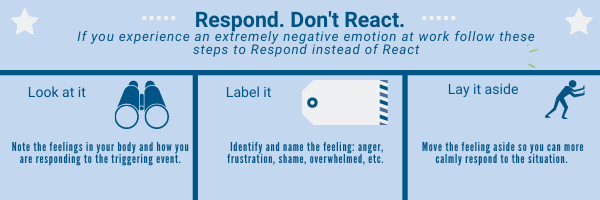
Knowing how to handle emotions at work can help you navigate tough situations. Humans are emotional creatures and embracing emotions as a part of daily life can help better you perform better when things get tough.
Emotions are part of human nature, and they serve a purpose.
Emotions can move you to action. They help you make decisions quickly without having to spend a lot of time thinking. If you need to flee, attack, or protect yourself, feelings help move you to action.
They can help you make decisions that can keep you healthy and safe.
But we often think that there’s no place for emotions at work, and it’s better to leave them at home. But rather than fully suppress our emotions, the better approach is learning to manage them in a healthy way.
Negative emotions indicate something needs to change. Here’s exactly how to handle negative emotions at work to maintain boundaries, respect, and get what you need.
Rather than fully suppressing emotions at work, learn to manage them in a healthy way.
Why it can be good to embrace your emotions

A big part of emotional intelligence is being aware of your emotions. Awareness of and managing your emotions at work can impact how well you perform and your relationships with peers.
And strong emotions can be indicators that you need to pay attention to something – or that something needs to change.
An emotional reaction indicates there may be a problem. Rather than ignoring a negative emotion, take a look at how you feel and what’s happening around you.
You may notice that your feelings, or even others’ emotions, are a clue that there’s a problem to solve.
Strong emotions signal there’s a problem or something needs to change.
Regulating Emotions at Work

While it’s important to acknowledge emotions at work, emotional regulation is also important. Reacting strongly to a negative emotion can have bad outcomes. Emotions play a role in judgment, decision making, and job performance.
And maintaining composure is an essential quality of a great project manager.
A positive emotion might be welcome. But acting on resentment or outrage can have negative consequences. And constant fear or worry can impact your mental health and impact job satisfaction.
Common Negative Emotions

Emotional intelligence allows you to not only recognize feelings in yourself and others. It also allows you to maintain composure during difficult situations. Workplace success relies on identifying your emotions in a stressful situation and managing them in a healthy way.
Learn to identify when you experience these feelings. You’ll improve your emotional intelligence, leadership, and overall job performance.
Workplace success relies on identifying your emotions in a stressful situation and managing them in a healthy way.
Anger
It’s hard to stay calm in the face of anger – whether it’s directed at you from someone else, or anger you’re feeling at a person or situation. It’s easy to get sucked into it, but anger can cause you to react in ways you may regret later.
Rage can be destructive and cause more problems. Acting on anger can damage your reputation, relationships, and even cost you your job.
For this reason, it’s critical to calm down and control your behavior if you’re angry.
What to do
- Know the early warning signs if you have trouble controlling your temper. Notice what happens in your body when you start to feel angry. You may have tightness in your scalp or chest. You may clench your jaw or fists. Your ears may burn, or you may even see red.
- If you feel yourself getting angry, take steps to calm yourself as quickly as possible. Take several deep breaths to calm yourself. Divert your attention to notice the sensation in another part of your body, such as your hands or the soles of your feet.
- Don’t raise your voice or get sucked into arguments when tempers are high. Instead, maintain a calm demeanor. Speak calmly and clearly.
- Take a step back or away if you can. If you’re engaging in a discussion you need to come back to, let others know that you’ll return to the discussion or address the matter. Take a walk or at least leave the room for a while to calm down.
- Exercise can be a good way to get it out of your system emotionally and relieve any tension you may feel from getting angry. And exercise can provide you with endorphins to counteract the negative feelings.
- Don’t respond when your temper is high without calming down first. Step back and take time to calm down before sending any emails or confronting someone while you’re still angry.
Taking a moment to calm down allows you to respond in a way that’s more productive and respectful.
Frustration
Frustration is often caused by feeling stuck.
It may be that you can’t move a project forward, you’re left in the dark on decisions or discussions, or there’s bureaucracy or roadblocks keeping you from making progress.
What to do
- Identify what actions you can take to move things forward or change things. Identifying the next steps you can take can help you feel like you’re taking control, and could actually help you move things forward.
- Find someone to talk with who can help you think through the next steps. Sometimes it takes someone with a different perspective to help you get a clear perspective and decide how to move things forward.
Fear. Worry.
There are many stressors that can cause fear and worry at work: tight deadlines, meeting expectations, and even office politics.
It’s easy to fixate on the things that are worrying you.
If you allow it, fear and worry can grow and can consume all your attention, and destroy your productivity.
It can ruin your confidence.
Fear can negatively impact morale and even make you sick.
What to do
- To get past the anxiety, first, identify what is bothering you. This will help you identify steps to take to change the situation.
- Taking action is a great way to deal with worry and fear. If you’re worried about not growing in your career or missing promotions, identify ways to provide value. If you’re worried about project risk, meet with the team to discuss risks and create a project management risk matrix.
- If you find that your thoughts are spiraling into other anxious thoughts, do a brain dump on paper. This allows you to get all the thoughts out of your head and slows your thinking because you can’t write as fast as you can think.
- Share how you feel with someone you trust. Sometimes simply venting in a safe space with a person who respects your privacy can help you feel more supported. This will help better manage the stress.
- And it’s okay to ask for help if you need it. For example, if the source of your anxiety is an overwhelming workload, having a conversation with your boss can help. You may need to say no to some projects. Learn how here: When and How to Say No to a Project
Disappointment
Dealing with disappointment over not being selected for a job, project, or award can cause you to feel defeated and impact productivity. If a project you’ve been driving forward is suddenly canceled, it can make you feel letdown and maybe even momentarily depressed.
What to do
- It’s okay to honest about your disappointment. Acknowledge how you feel to yourself. It’s okay to share with others if you’re comfortable with sharing, without going overboard or complaining.
- Don’t hold grudges. Don’t hold onto the feelings for a long time. Recognize when it’s time to move forward.
- To counteract disappointment, if it’s a result of a goal you didn’t achieve, look at different ways to reach it. Reconsider if there may be a different goal you’d prefer to try for instead. Or look for the learning opportunities to identify what kept you from reaching your goal, and what you can do differently going forward. If there are decision-makers involved, talk with them to find out what you can do going on to make improvements going forward.
- If the source of your disappointment isn’t so obvious, journal or write about your situation to help identify the source. This will help you know where to make changes.
Other Tips for Managing Emotions At Work

Managing your emotions at work can be an ongoing challenge if you work in an unhealthy environment. These steps can help you manage difficult emotional situations.
1. Be aware of triggers.
Learn to identify what can cause negative emotions. If you know what events can cause stress or worry, you can better prepare how to deal with them.
2. Avoid toxic situations.
Avoid things that cause stress and worry if possible. It’s not always best to avoid activities that cause stress, so recognize when it’s best. For example, if speaking in public worries you, but you know it will be great for your career or project, learn how to manage those feelings and lean into the opportunity. But if having lunch with a certain group of coworkers always includes malicious gossip that leaves you drained and depressed, it may be best to change your lunch plans.
3. Be aware when negative feelings arise.
Learn how to notice early when you start feeling negative emotions. You will have thoughts and physical responses in your body that give you clues.
4. Take a deep breath.
Deep breathing exercises can help you relax, which can help with stress and negative feelings.
While sitting comfortably, breathe in through your nose slowly. Fill your lungs with air and expand your abdomen. Then slowly exhale through your mouth or your nose. Repeat and allow yourself to calm as much as possible.
5. Observe your feelings.
Observing your feelings can positively impact how you experience them. If you take a moment to observe the feeling you can get more control over the situation, rather than feeling like a victim to it. Being mindful of what you’re feeling can help you bring a strong emotion down a level to better handle a stressful situation.
6. Don’t bottle up your emotions.
Bottling up your feelings can lead to increased stress and poor health. Find someone you trust to talk with. This may even be someone outside of work. This can help you take a step back and get perspective. It can also help you better manage stress, frustration, or anger.
7. Reframe the situation.
Look at the problem from a different perspective. It may be that a difficult co-worker or boss is under a great deal of pressure you may not know about. Or you may look at a challenge as a great growth and learning opportunity.
In this post on managing presentation nerves, I explain how your thoughts create your feelings, which in turn impact your actions. Shifting your perspective changes the way you think about an event, and in turn, changes the way you feel about it.
8. Get Clarification
Before reacting, make sure you understand the situation. Rather than jumping to conclusions about a situation or someone’s intent, ask for more information.
Before reacting, make sure you understand the situation. Rather than jumping to conclusions about a situation or someone’s intent, ask for more information.
9. Respond. Don’t React.

To avoid an emotional outburst, control any extreme negative emotions if they threaten to take over.
When an event triggers an extreme negative emotion, take time to control it. Look at it, label it, and lay it aside.
- LOOK AT IT: Note the feelings in your body and how you are responding to the triggering event.
- LABEL IT: Identify and name the feeling: anger, frustration, shame, overwhelmed, etc.
- LAY IT ASIDE: Move the feeling aside so you can more calmly respond to the situation.
If you notice tightness in your body, increased heart rate, or even ringing in your ears, take a moment – or longer if needed – to step back and assess the situation. Give yourself time to gather your thoughts and respond in a healthy way rather than doing something that could cause serious problems. This article on assertive communication skills walks you through healthy ways to communicate and maintain boundaries, respect, and relationships.
Take time to consider what action would be in your best interest. Then act accordingly, but doing so from a place of careful consideration, rather than from frustration or even spite.
10. Be respectful.
Treat others with respect.
Even if a peer is behaving badly, you can still stand up for yourself and your boundaries while sharing how you feel. Using assertive communication skills will help you communicate your needs while maintaining professionalism and respect.
If someone else is yelling, staying calm can deescalate a situation. Conflict can be productive if approached correctly, but it’s important to maintain a safe and respectful space.
If there are things that cause stress and worry, avoid those situations if you can.
Emotional Exhaustion

If you’re feeling emotionally drained from the stresses of work and/or life, you likely have emotional exhaustion. Some of the symptoms of emotional exhaustion include the following:
- trouble sleeping
- headaches
- lack of motivation
- irritability
- depression
Long working hours, job stress, and other life stressors can cause emotional exhaustion. This can lead to burnout and even more serious results.
It’s important to take care of yourself, eliminate the stressors you can, get enough sleep and exercise, and take breaks. It’s also important to have support. Use your support network or develop one. And seek professional support if needed.
Summary

Whether you’re dealing with difficult conversations, knowing how to manage uncomfortable emotions at work can help you maintain composure, look for needed changes, and improve performance.